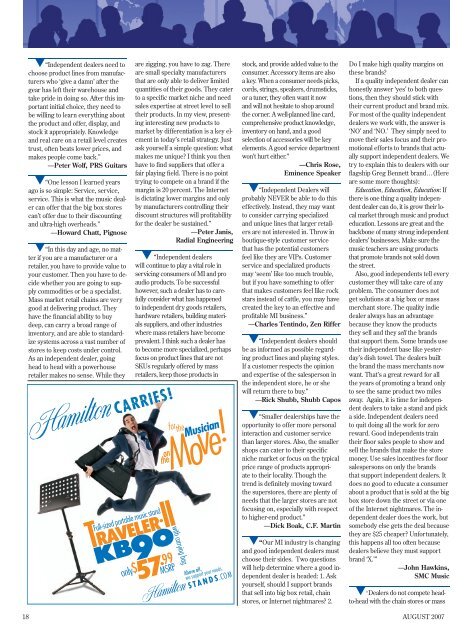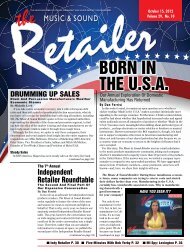MS Retailer August 15, 2007 - Vol.24 No.8 - Music & Sound Retailer
MS Retailer August 15, 2007 - Vol.24 No.8 - Music & Sound Retailer
MS Retailer August 15, 2007 - Vol.24 No.8 - Music & Sound Retailer
- No tags were found...
You also want an ePaper? Increase the reach of your titles
YUMPU automatically turns print PDFs into web optimized ePapers that Google loves.
▼“independent dealers need tochoose product lines from manufacturerswho ‘give a damn’ after thegear has left their warehouse andtake pride in doing so. after this importantinitial choice, they need tobe willing to learn everything aboutthe product and offer, display, andstock it appropriately. Knowledgeand real care on a retail level createstrust, often beats lower prices, andmakes people come back.”—Peter Wolf, PRS Guitars▼“one lesson i learned yearsago is so simple: service, service,service. this is what the music dealercan offer that the big box storescan’t offer due to their discountingand ultra-high overheads.”—Howard Chatt, Pignose▼“in this day and age, no matterif you are a manufacturer or aretailer, you have to provide value toyour customer. then you have to decidewhether you are going to supplycommodities or be a specialist.Mass market retail chains are verygood at delivering product. theyhave the financial ability to buydeep, can carry a broad range ofinventory, and are able to standardizesystems across a vast number ofstores to keep costs under control.as an independent dealer, goinghead to head with a powerhouseretailer makes no sense. While theyare zigging, you have to zag. thereare small specialty manufacturersthat are only able to deliver limitedquantities of their goods. they caterto a specific market niche and needsales expertise at street level to selltheir products. in my view, presentinginteresting new products tomarket by differentiation is a key elementin today’s retail strategy. Justask yourself a simple question: whatmakes me unique? i think you thenhave to find suppliers that offer afair playing field. there is no pointtrying to compete on a brand if themargin is 20 percent. the internetis dictating lower margins and onlyby manufacturers controlling theirdiscount structures will profitabilityfor the dealer be sustained.”—Peter Janis,Radial Engineering▼ “independent dealerswill continue to play a vital role inservicing consumers of Mi and proaudio products. to be successfulhowever, such a dealer has to carefullyconsider what has happenedto independent dry goods retailers,hardware retailers, building materialssuppliers, and other industrieswhere mass retailers have becomeprevalent. i think such a dealer hasto become more specialized, perhapsfocus on product lines that are notsKus regularly offered by massretailers, keep those products instock, and provide added value to theconsumer. accessory items are alsoa key. When a consumer needs picks,cords, strings, speakers, drumsticks,or a tuner, they often want it nowand will not hesitate to shop aroundthe corner. a well-planned line card,comprehensive product knowledge,inventory on hand, and a goodselection of accessories will be keyelements. a good service departmentwon’t hurt either.”—Chris Rose,Eminence Speaker▼“independent dealers willprobably neVeR be able to do thiseffectively. instead, they may wantto consider carrying specializedand unique lines that larger retailersare not interested in. throw inboutique-style customer servicethat has the potential customersfeel like they are ViPs. customerservice and specialized productsmay ‘seem’ like too much trouble,but if you have something to offerthat makes customers feel like rockstars instead of cattle, you may havecreated the key to an effective andprofitable Mi business.”—Charles Tentindo, Zen Riffer▼“independent dealers shouldbe as informed as possible regardingproduct lines and playing styles.if a customer respects the opinionand expertise of the salesperson inthe independent store, he or shewill return there to buy.”—Rick Shubb, Shubb Capos▼“smaller dealerships have theopportunity to offer more personalinteraction and customer servicethan larger stores. also, the smallershops can cater to their specificniche market or focus on the typicalprice range of products appropriateto their locality. though thetrend is definitely moving towardthe superstores, there are plenty ofneeds that the larger stores are notfocusing on, especially with respectto higher-end product.”—Dick Boak, C.F. Martin▼“our Mi industry is changingand good independent dealers mustchoose their sides. two questionswill help determine where a good independentdealer is headed: 1. askyourself, should i support brandsthat sell into big box retail, chainstores, or internet nightmares? 2.do i make high quality margins onthese brands?if a quality independent dealer canhonestly answer ‘yes’ to both questions,then they should stick withtheir current product and brand mix.For most of the quality independentdealers we work with, the answer is‘no’ and ‘no.’ they simply need tomove their sales focus and their promotionalefforts to brands that actuallysupport independent dealers. Wetry to explain this to dealers with ourflagship Greg Bennett brand…(Hereare some more thoughts):Education, Education, Education: ifthere is one thing a quality independentdealer can do, it is grow their localmarket through music and producteducation. lessons are great and thebackbone of many strong independentdealers’ businesses. Make sure themusic teachers are using productsthat promote brands not sold downthe street.also, good independents tell everycustomer they will take care of anyproblem. the consumer does notget solutions at a big box or massmerchant store. the quality indiedealer always has an advantagebecause they know the productsthey sell and they sell the brandsthat support them. some brands usetheir independent base like yesterday’sdish towel. the dealers builtthe brand the mass merchants nowwant. that’s a great reward for allthe years of promoting a brand onlyto see the same product two milesaway. again, it is time for independentdealers to take a stand and picka side. independent dealers needto quit doing all the work for zeroreward. Good independents traintheir floor sales people to show andsell the brands that make the storemoney. use sales incentives for floorsalespersons on only the brandsthat support independent dealers. itdoes no good to educate a consumerabout a product that is sold at the bigbox store down the street or via oneof the internet nightmares. the independentdealer does the work, butsomebody else gets the deal becausethey are $25 cheaper? unfortunately,this happens all too often becausedealers believe they must supportbrand ‘X.’”—John Hawkins,SMC <strong>Music</strong>▼“dealers do not compete headto-headwith the chain stores or mass18 auGust <strong>2007</strong>
















